#labour rights
Text
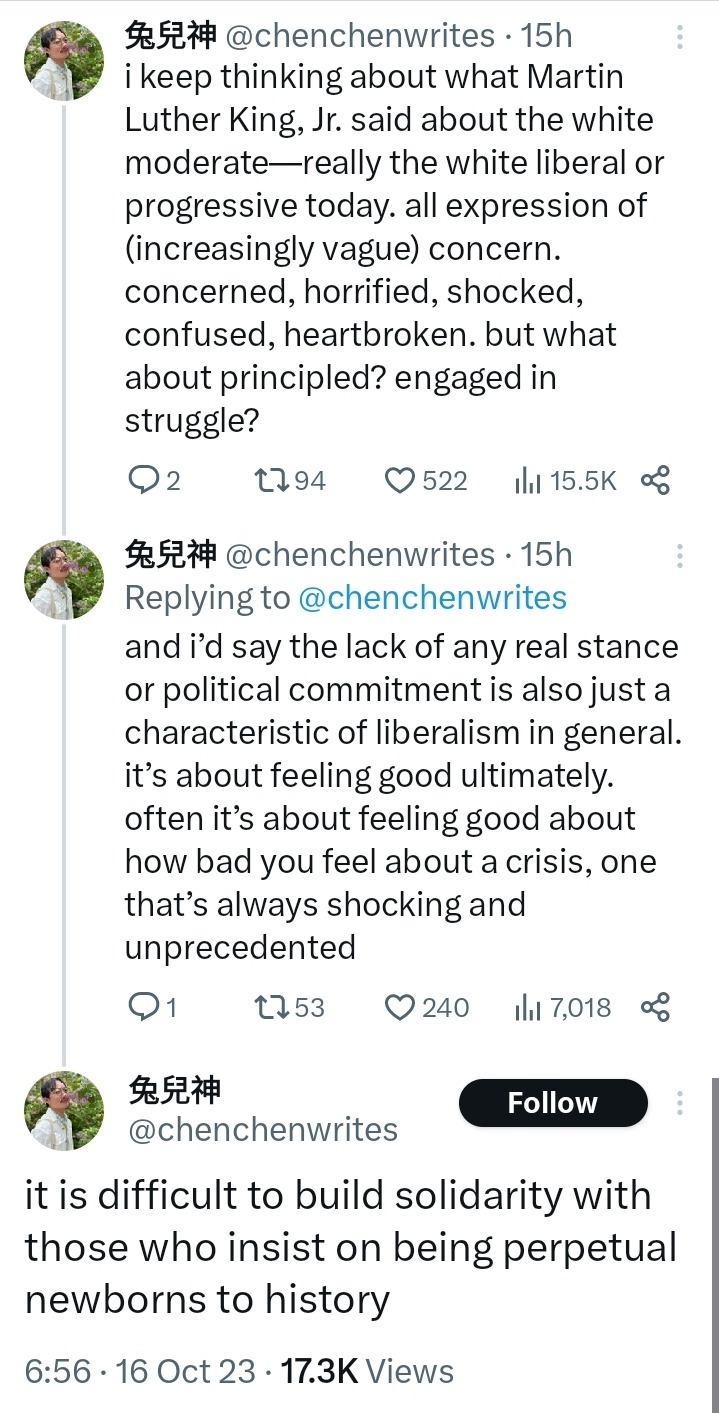
History isn't a disparate collection of stories from long ago. It's the necessary context for the present moment and the forecast for the future. All histories are intertwined, and the narratives of power and privilege, oppression and resistance, adversity and triumph are as constant in their patterns as the laws of physics.
#free palestine#black lives matter#landback#civil rights movement#war on terror#fascism#imperialism#colonization#genocide#colonialism#indigenous sovereignty#climate change#military industrial complex#current events#labour rights#trans genocide#eugenics#this describes literally every political struggle going on right now#and western leftists and liberals are like pikachu face and handwringing every damn time and I AM TIRED#you dont even need to know the entire history of palestine and israel#you just need to understand how colonization and ethnic cleansing and fascism WORKS#you are morally obliged to actively seek education and have a unequivocal stances against violation and annihilation#knee of huss
534 notes
·
View notes
Text
A newspaper in my country has interviewed Siddharth Kara, one of the experts on what's going on in the cobalt mines in Congo. I think it's very well explained and a must-read to get an overview of this huge human rights violation that is going on. So here I translate it to English, hoping it will reach more people.
Siddharth Kara: "Every time we buy a new mobile phone, we put our foot around the neck of a child in the Congo"
Interview with the author of Cobalt Red: How the Blood of the Congo Powers Our Lives
"The poorest people in the world, including tens of thousands of children, dig the earth in toxic and very dangerous conditions to find cobalt," says journalist and writer Siddharth Kara (Knoxville, Tennessee, USA, 1974). The rechargeable batteries of our mobile phones, tablets, laptops or electric vehicles need this mineral that thousands of children, men, women and elderly people extract from the Congolese mines in inhumane conditions. Kara went there because he had specialized in research on slavery, and in Congo he found a modernized form of slavery. "Time has passed, but the colonial mentality has not," he explains. Everything he saw there and what was explained to him is recounted in Cobalt Red: How the Blood of the Congo Powers Our Lives (a book that does not have a translation into Catalan, but which has now been translated into Spanish, by Capitán Swing). The photographs and videos illustrating this interview were taken by himself.
—Was it difficult to write this book?
—Yes. Firstly, because of the specific difficulty of this area of the Congo: very dangerous, very militarized. There are armed militias. And for the local people there it is dangerous to talk to foreigners, because it can bring them consequences. It was difficult to get there, and then it was difficult to build trust with the people who worked there. I only managed it thanks to this trust, which we achieved little by little, until we were sure that we could do the research with guarantees and ethically.
—What drove you to the Congo cobalt mines?
—I had been doing research on slavery since 2000. Around 2016, some African colleagues contacted me and said: “Siddharth, something terrible is happening in the cobalt mines of the Congo, maybe you should go there”. I had no idea what cobalt was. I thought it was a color used for painting. I didn't know it was used for rechargeable batteries. It took me a couple of years to grasp its importance. Then I started making contacts to travel there, and in the summer of 2018 I went there.
—And what did you find there?
—The suffering and degradation I saw there were so intense that I decided to return there often to write a book. Hundreds of thousands of the world's poorest people, including tens of thousands of children, dig the earth in toxic and very dangerous conditions to find cobalt and put it into circulation, in a distribution chain that goes to the rechargeable devices and cars that people like you and me use every day. It was a human apocalypse, a total invasion of human rights and the dignity of the Congolese people.
—Could you describe what a mine like this is like, physically? How should we imagine it?
—Those who are at the top of the economic chain of cobalt exploitation like to distort the truth, and use the term "artisanal mine". This way, they evoke a kind of picturesque activity, but on the ground it is a dangerous and degrading job. A mine of this kind is a mass of tunnels, pits and trenches filled with thousands of people who dig with shovels, pieces of metal or directly with their bare hands. They fill a sack with earth, stone and mud. Some children rinse it in toxic pools to separate the mud from the cobalt stones, which a whole family pours into another sack. It might take twelve hours to fill a forty-kilo sack or two. For each sack they get paid a few euros, very few, and that's how they live every day. They survive.
This video was filmed by Siddharth Kara: [you can watch the video in the interview link, freely available without any paywall, here]
—Is there any rational organization in these mines? Is there someone who decides who does what to optimize work?
—Well, there is a whole gear designed so that the poor and the children of the Congo produce hundreds of thousands of tons of cobalt every year. There, work is usually divided by age and gender. Digging tunnels, which requires a lot of strength, is usually done by young men and teenagers. The digging of small pits and trenches that can be less meters deep is done by women and smaller children. Rinsing this toxic cobalt is usually done by the children. The merchant system to exploit these families and sell the cobalt they produce to the formal industrial mines is very well set up.
—What else do these people at the top of the chain invent?
—Another fiction they invent is that there is a difference between industrial and artisanal mining, and that they only buy from the industrial one, where there is no child labor. Not true: all cobalt is mined by children. All the cobalt that the children and peasants extract goes straight to industrial mining. In addition, there is no way to separate what comes from a bulldozer and what comes from a child, once it all pours into the same place in the facility that does the industrial processing before this cobalt is sent out of the Congo.
—You explain that the situation is particularly abusive for women.
—Yes. It is a lawless land, and violence is the norm. Women and girls always bear the brunt: they are victims of physical and sexual violence, and almost no one talks about it. It is a major tragedy: they are victims of sexual assaults that are committed in the mines themselves, while they collect the cobalt that we have in our mobile phones.
—You refer to all of this as a new episode of slavery. It is not the first time that the Congo has a decisive material for Western economic development. It happened with uranium for nuclear bombs, for example. History repeats itself.
—Exactly. It is important for people to understand that we are not witnessing an isolated case, but the latest episode in a long, very long, history of looting of the Congo, a very resource-rich country, dating back to the colonial period. The first automobile revolution required rubber for tires. The Congo had one of the largest rubber tree rainforests in the world. King Leopold [of Belgium] deployed a mercenary army of criminals and terrorists to enslave the population and make them work to get it. This inspired Joseph Conrad's novel Heart of Darkness. The Congo also has abundant reserves of gold, diamonds, nickel, lithium and other metals and minerals that make components for electronic devices…
—These mercenaries deployed by King Leopold, are they still there today, in one way or another?
—Yes. On the ground there are militias, or the army, or private security forces that the mining companies hire and that, sometimes, in addition to monitoring, do the work of recruiting children. Under the threat of an occupation, they force an entire town to dig. It's atrocious: we live in an age of supposed moral progress, where everyone shares the same human rights, and yet our global economic order has its knee on the necks of the children and the poor of the Congo, with this huge demand for cobalt that has to fuel the rechargeable economy.
—Has no Western country or international body done anything to stop it?
—No. No western country, no government, no big business has lifted a finger to address this tragedy. They talk about maintaining human rights standards in their supply chains, they talk about environmental sustainability, but it's only talk. That is why it is very important that journalists and researchers set foot on the land of the Congo and listen to what the Congolese have to say: that no one protects their rights or their dignity, that they are erasing the environment, that mining it is not done in a sustainable way and the whole countryside is polluted and destroyed by the mining operations. It is enough to walk ten minutes around a mine to see it.
—Does the same happen in all mines? Large Western companies that use cobalt often claim that theirs comes from artisanal mines that meet standards.
—Have they gone there? There is no decent mine in the Congo. It does not exist. I'll be happy to take any CEO of any tech company to their mines, where their cobalt comes from. We'll stand there, watching them extract it, and take a selfie with it. Everyone will realize that what is seen behind us is not decent. You will see destruction, millions of trees felled, installations that emit toxic gases that fall on the surrounding towns, on the children, on the animals, on the food. There is no decent mine in the Congo. And they know it. But who will believe the voice of a Congolese if they can drown it out with proclamations of human rights while they continue to make money without measure?
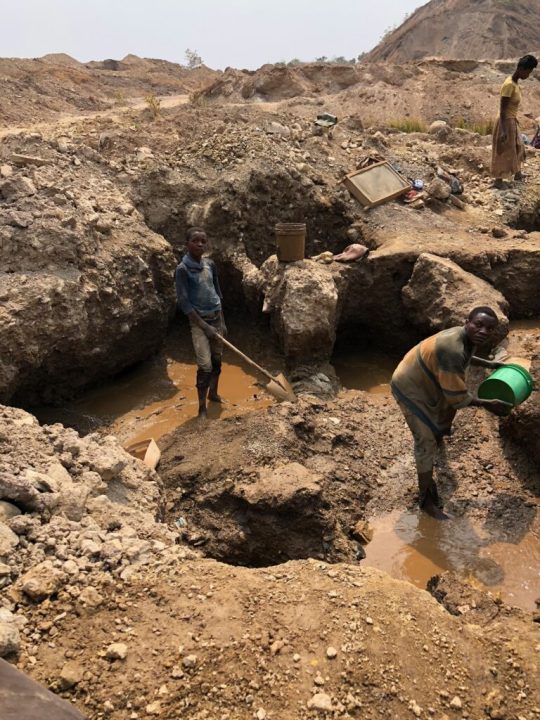



—Can you explain the role China plays in all of this? You say that it controls the supply chain.
—Yes. China controls about 70% of mining production in the Congo. Why do we accept China saying its mines are decent, if they don't even protect the human rights of their own people? Why do we accept a technology company or a car manufacturer saying, "My Chinese partners say they protect human rights there, and that's enough for me"? Why do we accept it?
—Why do you say that a certain transition to green energy is absolute hypocrisy?
—When the calls in favor of this transition consist of proposing to consumers that they buy electric vehicles instead of gasoline cars, this is hypocrisy. Because the cobalt and other elements that are used for the batteries of these cars are extracted using methods that are catastrophic for the environment. While in one part of the world we say we want to save the environment and leave a greener planet to our children, in another we are destroying both the planet and the future of their children. How can you save only part of the planet, turning the rest into a toxic dump? How can we give a green planet only to our children, while we let other people's children die? This is hypocritical.
—It is a reflection of the domination that the global north maintains over the south.
—We have never given Congo the opportunity to benefit from its own resources. It is a colonial mentality: time has passed, but the colonial mentality has not. It is the same type of colonial plunder from a century and a half ago. It is colonial to say: "Look, we need this, they have it, we take it from them in any way and, when we no longer need it, we leave a catastrophe behind us". There are companies that, recently, have started to pretend that they are becoming aware of this and promised that they would try to use batteries that did not have cobalt, but in reality they said: "Well, we've been caught, we'll look for another mechanism". And they do nothing to solve the catastrophe. Even if we no longer needed cobalt tomorrow, we would have to repair the destruction we have caused these past fifteen years.
—It's the big companies who should be required to react, but what do you think a Western consumer who has gotten upset reading you could do?
—The first step to progress in the conquest of human rights is always to make injustice known. Contribute to make everyone knows. Most people are good and, in their hearts, want no part of injustice. It is the few who move based on avarice and greed who pollute the rest of humanity. Outreach and awareness is the first step because it will inevitably activate a lot of people. Change always starts like this. In the case of cobalt, the second step is to think about our consumption habits. Every twelve months, the technology company I bought my phone from offers me a new one. Do I really need it? Every time we buy a new mobile phone, we put our foot on the neck of a child in the Congo. Better think twice, then.
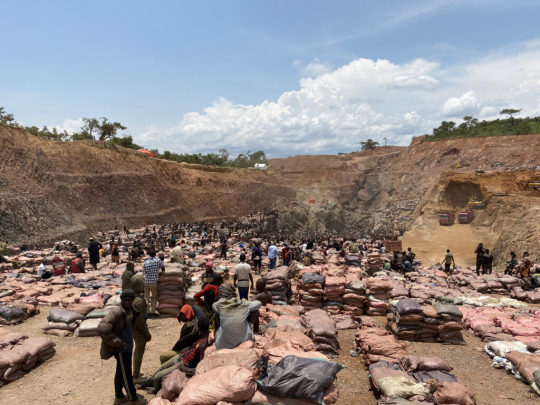
#congo#human rights#electric vehicles#electric cars#colonialism#labour rights#china#environmentalism#rape culture#feminism#slavery#africa#cobalt#labor rights#anti racism#free congo#siddharth kara#childrens rights#history#💬
178 notes
·
View notes
Text
The first strike votes taken by public sector common front unions show unequivocal support for a walkout.
Almost all the votes recorded during this first week of meetings, which have been made available to The Canadian Press, exceed 90 per cent support for the strike. However, not all of them have been made public yet.
The mandate being sought by the common front unions - the CSQ, CSN, APTS and FTQ - is an unlimited general strike, to be preceded by strike days, isolated or grouped together.
The votes held so far concern the health and social services sector as well as the education and CEGEP sectors.
Continue Reading.
Tagging: @politicsofcanada
264 notes
·
View notes
Text
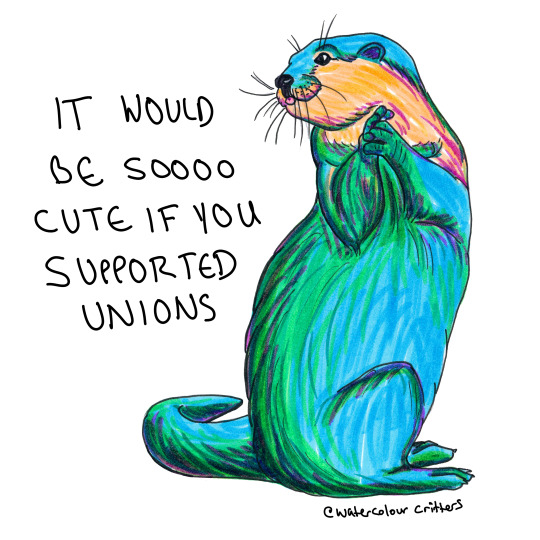
in this house we love and support unions!!
[ID: marker art of an otter coloured in shades of blue, green, pink and peach. It is sitting on its hind legs and turning to the side with its forepaws clasped together and its tongue sticking out a little. Text reads "It would be sooooo cute if you supported unions" in messy all caps handwriting. The background is plain white, and the artist's signature reads @ watercolourcritters. End ID.]
#unions#support unions#labour rights#and yes this includes the#writers strike#and any other strikes#watercolour critters art#messy encouragement cards
396 notes
·
View notes
Text
Strike Etiquette:
Please note: This applies to everyone, not just members of a union or a specific union. This applies to you. Yes. You. You, too. Also you. No, you can't use a note from your mom to get out of it.
DO NOT SCAB. EVER. In the case of the WGA, if you scab you will never be allowed to join. Period. No exceptions. Even if that weren't the case, please understand that union protections are not enforced if you're strike-breaking. You will get screwed in perpetuity for a quick buck. Don't fuckin' do it. Don't betray your fellow workers by scabbing. You're placing striking workers in danger and increasing their hardship.
DO NOT CROSS A PICKET LINE UNLESS YOU HAVE BEEN INSTRUCTED BY THE STRIKING UNION TO DO OTHERWISE. When nurses or doctors or hospital staff strike they absolutely will instruct the public to cross their picket line. I don't care what your excuse is. It's a shit excuse and you can shove it. Unless you've been told by the striking union it's okay you never, ever, ever, ever cross a picket line in any way.
DO NOT BOYCOTT UNLESS AND UNTIL THE STRIKING UNION CALLS FOR ONE. Unions are backed by smart organisers who know when to start and how to structure a boycott for maximum effectiveness. Trust that unions know what they're on about and FOLLOW THEIR LEAD.
SUPPORT STRIKING WORKERS. Post messages of solidarity on social media. Encourage others to follow strike etiquette. If you can show up and show the striking workers on the picket line your support. Donate to a strike fund. Find out what you can do to help others unionise. Unionise your own workplace if that's feasible.
This has been a public service message from me. Thank you for your time.
306 notes
·
View notes
Text
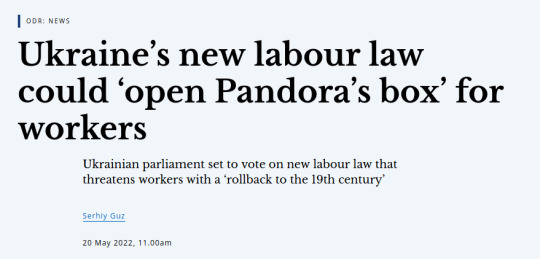

[20 May 2022]
“With one letter [our employer] sent us away, and our dialogue turned into a monologue,” says Anton Gorb, a trade union representative at Ukraine’s largest private postal service, New Post. [...]
In March, the Ukrainian parliament passed wartime legislation that severely curtailed the ability of trade unions to represent their members, introduced ‘suspension of employment’ (meaning employees are not fired, but their work and wages are suspended) and gave employers the right to unilaterally suspend collective agreements.
But beyond this temporary measure, a group of Ukrainian MPs and officials are now aiming to further ‘liberalise’ and ‘de-Sovietise’ the country’s labour laws. Under a draft law, people who work in small and medium-sized firms – those which have up to 250 employees – would, in effect, be removed from the country’s existing labour laws and covered by individual contracts negotiated with their employer. More than 70% of the Ukrainian workforce would be affected by this change.
Against a background of concerns that Ukrainian officials are using Russia’s invasion to push through a long-awaited radical deregulation of labour laws, one expert has warned that the introduction of civil law into labour relations risks opening a “Pandora’s box” for workers. [...]
But in April, under Ukraine’s wartime suspension of certain labour rights – which was billed as ‘temporary’ – New Post’s management revoked 30 points of the collective agreement with the trade union.
Most of these points relate to coordination of working conditions with trade unions, but also some social guarantees, such as providing workers with uniforms, the availability of a first-aid kit at the workplace, working hours and others. [...]
“De facto, this regime assumes that literally anything can be entered into an employee’s employment contract, without reference to Ukrainian labour laws. For example, additional grounds for dismissal, liability, or even a 100-hour week,” explains Sandul.
Ukrainian workers had previously protested against the introduction of this law, but as protests have now been banned by the Ukrainian government (using wartime emergency powers) it’s unlikely they’ll be able to stop it going through.
2K notes
·
View notes
Text
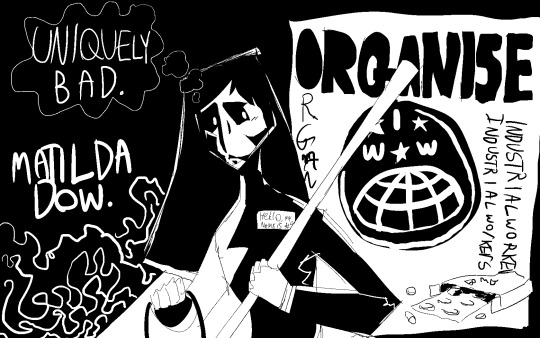
Every workplace is different, but that does not mean you cannot form a union there. Fellow Worker Matilda explains that many of us avoid organising in our workplaces by rationalising that our workplace is “uniquely bad” to organise in. But this is a product of fear and helplessness. When we recognise this and get support from other organisers, each of can break through the wall, no matter where we work.
#iww#union#unionorganising#unions#industrial workers of the world#labour rights#unionize#labor rights#article#essay
96 notes
·
View notes
Text
Fast fashion and crochet
While we're on the topic of crochet:
Please know that, unlike knitting, crochet cannot be manufactured by machines. This has a few consequences.
Labour exploitation:
Labour exploitation is rampant in the fast fashion industry: without it, the industry simply would not exist.
This means that if you see a genuine crocheted piece in a fast fashion shop, it was made by hand by someone who was paid peanuts for their labour, if paid at all.
Fibre crafts are very labour-intensive. This is why crocheted/hand-knitted items by indie designers are priced the way they are: you're not just paying for the materials. You're also paying for the hours that were needed to design and make the item. Even if the designer were to price those hours at minimum wage, they still add up.
Fast fashion strives to manufacture items as cheaply as possible. A lot of different things make up the final price you pay at a shop, such as design, materials, shipping, packaging, marketing,... Labour is only a fraction of that price, and garment workers rarely get paid a living wage as to keep the prices down.
Take this seven part TikTok breakdown of a crocheted Target bikini top by Drea's Hook, for example. After replicating part of the top, she estimates it would take about 3 hours to crochet the full item by hand (and it was crocheted by hand). That doesn't even account for the materials, the labour needed to sew the lining and the tag, the design, shipping, stock photos,... Yet it only costs $22. If the person who crocheted the top was paid at all, it can hardly have been more than a few cents.
Stolen designs:
On top of labour exploitation, there's been multiple scandals regarding fast fashion brands stealing designs by independent crochet artists such as Knots & Vibes or Loupystudio, among others.
Design theft not only profits off the work done by the original designer without any form of compensation in return, it also devalues the work needed to make an item.
The average person doesn't know how much work goes into making clothes. When fast fashion brands knock off original designs and sell them for a fraction of the price, it propagates the idea that the original item was priced unfairly. After all, why would someone charge €250 for a sweater when you can buy a similar one for €15 at H&M? This way, the industry keeps getting away with exploiting its workers while indie designers struggle to get by.
Can everyone afford to pay that €250? No, of course not. Even that €15 sweater can be a big financial hit if you're on a budget, and we all need clothes to keep us warm in winter. But practical issues aside, I think we can all agree that everyone deserves fair compensation for their work.
Conclusion:
People often assume their clothes have been made by machines. This is a logical assumption given the average fast fashion price tag, but unfortunately it's a wrong one.
Sure, we've got sewing and knitting machines and all other kinds of mechanical helps, but someone still has to work those machines. When an item has to be made by hand, like crochet, it will take longer. If the price tag doesn't reflect this extra labour, then neither will the worker's wage.
This blog will never shame anyone for buying fast fashion. Even if you're aware of the problems within the industry, there's plenty of valid reasons why quitting just isn't an option for most of us. We're stuck in a broken system that we cannot change overnight, and not everyone has access to alternatives.
That doesn't mean we can't chip away at it. Educating yourself about these issues is a big first step. It makes us more conscious about the clothes we wear and the labour and resources that went into making them, which in turn motivates us to take action. If more people were aware of these problems, the industry would be much less likely to get away with them.
#wasteless crafts#essay#random#community#fast fashion#slow fashion#sustainable fashion#sustainability#economy#capitalism#crochet#knitting#fibre crafts#fibre arts#consumption#labour#labour exploitation#design theft#labour rights
774 notes
·
View notes
Text
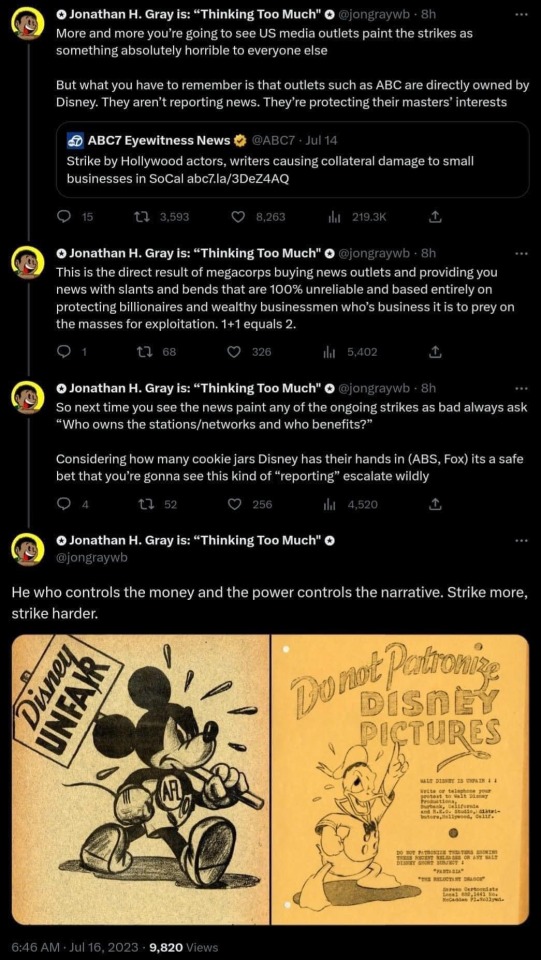
ID: A tweet by Jonathan H. Gray is: "Thinking Too Much"@jongraywb.
“More and more you're going to see US media outlets paint the strikes as something absolutely horrible to everyone else. But what you have to remember is that outlets such as ABC are directly owned by Disney. They aren't reporting news. They're protecting their masters' interests.”
The original tweet is quoting a tweet by ABC7 Eyewitness, which says
“News - Strike by Hollywood actors, writers causing collateral damage to small businesses in SoCal”.
Jonathan H. Gray is: "Thinking Too Much">@jongraywb goes on
“This is the direct result of megacorps buying news outlets and providing you news with slants and bends that are 100% unreliable and based entirely on protecting billionaires and wealthy businessmen who's business it is to prey on the masses for exploitation. 1+1 equals 2. So next time you see the news paint any of the ongoing strikes as bad always ask "Who owns the stations/networks and who benefits?" Considering how many cookie jars Disney has their hands in (ABS, Fox) its a safe bet that you're gonna see this kind of "reporting" escalate wildly. He who controls the money and the power controls the narrative. Strike more, strike harder.”
Below are two vintage or vintage-style black on sepia cartoons, one showing Mickey Mouse picketing with a sign reading “Disney Unfair” and another showing Donald Duck striking pointing to the words “Do Not Patronise Disney Pictures”, with other writing too small to be legible beneath. Both characters look angry.
#strikes#labour rights#hollywood strike#writers and actors strike#corporate bullshit#corporate lies#corporate misinformation#disney
69 notes
·
View notes
Text
Part one on my video essay series on the Fleischer Studios strike of 1937: the very first animation strike in history !
#max fleischer#Fleischer studios#popeye#Betty Boop#labor history#labor rights#labor movement#labour rights#labour history#animation industry#video essay#etc.#1940s#1930s#old Hollywood#wga#sagaftra#sag aftra#wga sag aftra strikes#Hollywood strikes#cel animation#cab Calloway
36 notes
·
View notes
Text
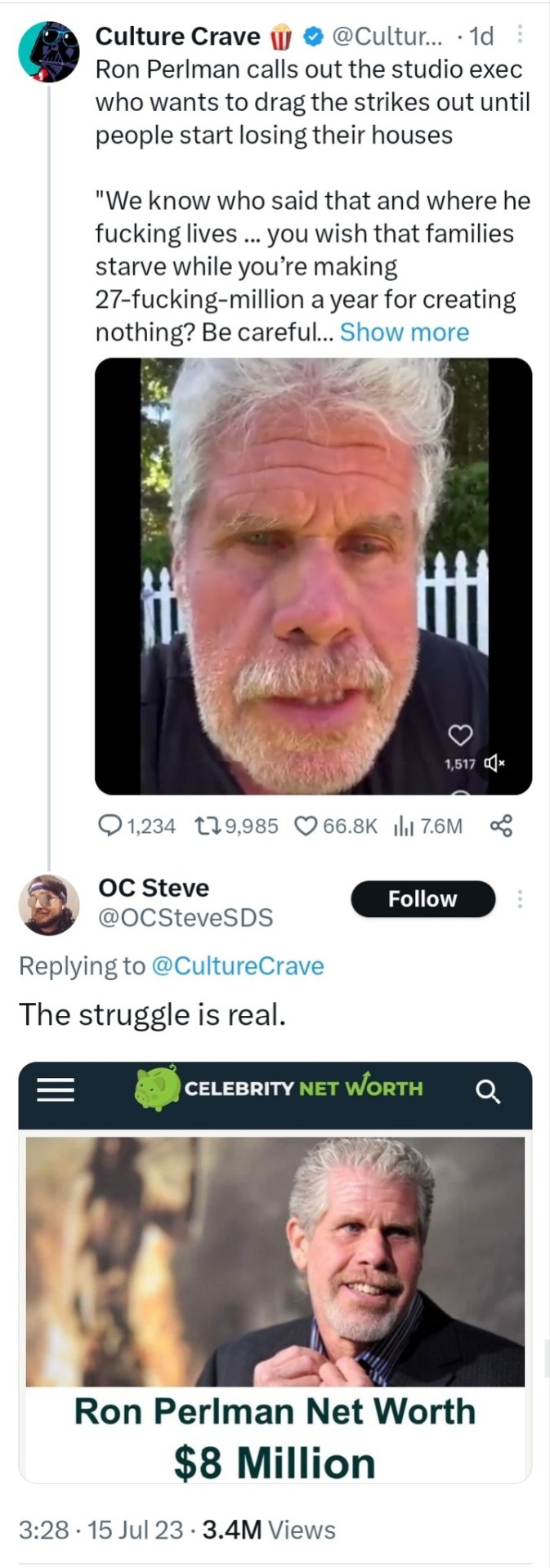
(alt included)
Showcase example of why I am deeply skeptical of Eat The Rich types. Too many of y'all are like this fuckhead who has no clue what rich requires eating.
Also for context: Ron Perlman has been acting since 1975. Studio exec Bob Igor made $27 million last year from Disney alone, just one of his streams of annual income, which includes but is not limited to stocks, real estate and consulting.
#sga strike#ron perlman#swa strike#us politics#hollywood#entertainment#labour rights#workers rights#capitalism#western leftists#class war#twitter#neoliberalism#worker exploitation#social justice#knee of huss
734 notes
·
View notes
Link
Indonesia is the largest democracy in the world without a law to protect its domestic workers. That may be about to change, with a bill that also paves the way to better rights for millions of Indonesians in places such as Hong Kong and Singapore.
But at home, many domestic employees will miss out on the law’s protections completely.
Almost 5 million domestic staff serve as the invisible backbone of South-East Asia’s largest economy, looking after upper-middle-class homes and freeing richer Indonesians to pursue more lucrative careers.
But they are often physically and socially isolated, leaving them particularly vulnerable to exploitation, assault and modern slavery.
The Domestic Workers Protection Bill, which President Joko Widodo aims to pass into law this month, gives household employees - three-quarters of whom are women - more of the rights afforded to formal workers.
Without it, "slavery will be much more entrenched in Indonesian mindsets,” said Lita Anggraini, the country’s leading activist on domestic workers’ rights.
She sees the bill as an important protection against the idea that "anything is acceptable for a domestic worker.”
Siti Khotimah, 24, is an example of just how bad things can get. She was just four months into working for a family in an affluent southern Jakarta neighborhood when her employer chained her, beat her and doused her with boiling water as punishment for a minor theft.
In the months that followed, she was forced to work up to 21 hours a day, her mobile phone was confiscated and her monthly pay of 2 million rupiah ($134) - less than 50% of Jakarta’s minimum wage - was withheld.
"I want to forget everything, but I can’t,” Khotimah said in an interview. The treatment she received during her eight-month stint as a domestic worker left her limping and desperate to return to her home, more than 300 kilometers away.
"I no longer want to work outside” the village, she said. "I’m traumatized.”
Khotimah’s case is an extreme one, and her employers have been charged with domestic violence and deprivation of liberty. But household staff currently have little or no recourse if employers fail to pay the agreed salary or expect round-the-clock service.
For nearly two decades, a bill to protect them has languished in parliament. Local customs that blur the line between employment and honorable service have been a stumbling block. "Ngenger,” for instance, is a Javanese tradition in which wealthy families take care of poorer relatives’ children. In return, the children carry out household chores.
Many policymakers have expressed concern that the bill will criminalize employers who engage in such practices, which advocates say helps poorer children to climb the social ladder through association with their richer relatives.
"In no other country will you find this culture of employing nephews as domestic workers,” said Law and Human Rights Vice Minister Edward Omar Sharif Hiariej. "We have some local cultural practices that differ with other countries, and it’s important to accommodate those.”
Policymakers are usually members of the upper-middle class themselves, Anggraini says, and may have four or five household staff of their own.
"In reality, the majority of lawmakers are employers,” she said. "They see themselves more as employers, rather than representatives of the people. So there is a conflict of interest.”
After months of pressure from workers, activists and the president himself, the latest round of discussions about the bill began in late March. For Jokowi, as the president is known, passing a law before he steps down next year would fulfil a campaign promise he made back in 2014.
Read More: Indonesian Ruling Party’s Presidential Pick Seen as Natural Successor to Jokowi
The bill requires employers and agents to uphold promised wages and working hours, and punishes physical assault with up to eight years’ imprisonment or fines of as much as 125 million rupiah ($8,233), according to a draft reviewed by Bloomberg. It also recognizes domestic helpers’ right to training, health insurance and social security.
For the employees it applies to, the bill meets many of the terms of the International Labour Organization Convention on Domestic Workers. Regulators and workers expect other policies - such as Indonesia’s existing commitments to end child labor and eradicate domestic violence - to fill some of the gaps.
However, the bill falls short of setting a minimum wage and working age, or capping working hours. Issues such as unionization also remain uncovered.
And there’s another, bigger catch. Domestic workers who are hired directly by a household, rather than via an employment agency, are not covered by the bill at all. Direct employees account for roughly 40% of all domestic staff, according to Anggraini.
Lawmakers felt it would be very difficult to enforce stringent labor regulations on direct hires given the informal nature of their employment, said Willy Aditya, who is leading the parliamentary team drafting the bill.
Direct hires must be reported to the local neighborhood head, Aditya said, but their living conditions are dependant on "an approach of mutual help and humanity.”
Many lawmakers, including Indonesia’s first female parliamentary speaker, Puan Maharani, initially resisted the bill citing concerns about customs such as ngenger. Maharani said she wanted to avoid controversy.
Vice Minister Hiariej did not respond to requests for comment about the issue of direct hires.
Still, the bill is a first step to improving protections for domestic workers in Indonesia. And as the country’s middle class expands, the number of household staff is expected to grow too. Around half a million joined the sector between 2008 and 2015, according to the ILO.
New regulations may also become a useful governmental bargaining chip in negotiating better conditions for Indonesians overseas. The nation is one of the world’s biggest sources of domestic staff, with 3.6 million of its citizens employed in wealthier homes around the world, mainly in Southeast Asia, Hong Kong and the Middle East.
"We’re sending a message to the world that Indonesian domestic workers get proper protections,” Vice Minister Hiariej said. "We always ask other countries to protect our domestic workers, and to ask that, we need a law ourselves.” - Bloomberg
41 notes
·
View notes
Text
New B.C. rules that came into force Jan. 1 increase the minimum age for young people allowed to perform hazardous work.
Employees need to be at least 18 for most hazardous tasks, including tree falling and logging, using a chainsaw, working underground, or work with exposure to certain harmful substances, according to the amendment to the Employment Standards Act.
The minimum age is 16 for work in construction, silviculture, forest firefighting, and for jobs from heights that require fall protection. [...]
Bains said B.C. was behind many other jurisdictions across the world in allowing youth to perform potentially dangerous work.
Previously, 16 was the minimum age for all types of work in B.C., but it hadn't been that way for long, according to the Ministry of Labour. Before July 21, 2021, the general working age, covering the vast majority of jobs, was 12 years old.
Bains said youth may be less likely than adults to voice their concerns.
"There is a power imbalance between adults and young workers who may not have the knowledge, confidence, or maturity to refuse unsafe work."
According to WorkSafeBC data, workers between the age of 16 and 18 received $26 million in job-related disability claims between 2012 and 2021, some of them after being left with permanent disabilities
Continue Reading.
Tagging: @politicsofcanada
110 notes
·
View notes
Text
Meanwhile in Finland (like Meanwhile in Sweden, but a bit to the east)
Right-wing government: We want to make these changes that would make it much easier for an employer to fire workers :) And these changes that would limit the striking-right for workers and unions :) And we want to cut down on these social welfare solutions that exist specifically to ensure that unemployed people won't starve :)
Very Literally Every Single Union In The Country: Are you fucking for real? NO. Absolutely not!
Right-wing government: Wait, why are you going on strike?
Unions: Because fuck you, that's why! What the hell is wrong with you?! You can't make those changes!
Right-wing government: Oh, but striking like this is so irresponsible! You're harming the economy! We're trying to avoid a recession!
Economists and other experts: Yyyeah no, your changes are what's triggering a recession. This is not going to help anyone.
Right-wing government: Fine, we'll negotiate! But we're pushing through these changes no matter what you think or say!
Unions: THAT IS NOT NEGOTIATING, YOU FUCKERS
#Meanwhile in Finland#politics#unions#labour rights#Finland#i am so very fucking exhausted by this nonsense
12 notes
·
View notes
Text
I’m not a political blog, I am aware of this, but the strike situation with education workers in Ontario right now is insane and if you’re someone who can’t see why these strikes are so important, you are part of the problem.
My mother was an English teacher for 30 years but is now retired. She stays in touch with her former colleagues, many of whom are still teachers. She spoke with one of them the other day, who is still an Educational Assistant. This woman has $400 dollars in her bank account, and will be spending $150 for a car repair. She has bills that companies are hounding her for that she can’t pay. Her husband is trying to get more work but they will most likely need to go to a food bank to survive. One of the students she works with attacked her the other day (the product of a breakdown where he wasn’t in control of his actions, and she has repeatedly stated she doesn’t blame him which shows the kindness in her heart). She has a bruise on her leg the size of a football because the kid threw a chair at her. Those are the kinds of things she has to go through for her job, and she is still not getting paid enough money to pay her bills and buy food to fucking survive.
Conservatives who do not want to raise wages for education workers will claim that school needs to continue no matter the cost. They will try to enforce this very real possibility that the government, for the first time in history, use the notwithstanding clause to prohibit further protest by teachers. They will happily celebrate the suppression of unions without ever seeing firsthand what EAs, guidance counselors, teachers, secretarial staff, and support workers in classrooms have to go through every day. So if you live in Ontario, please go picket if you can and support the education workers in your community. They deserve some love— and they deserve to get paid.
#and if you don’t have anything kind or constructive to say on this— don’t speak at all!#ontario politics#ontario#fuck doug ford#teacher strike#education workers#union rights#labour rights#canadian politics
99 notes
·
View notes
Text
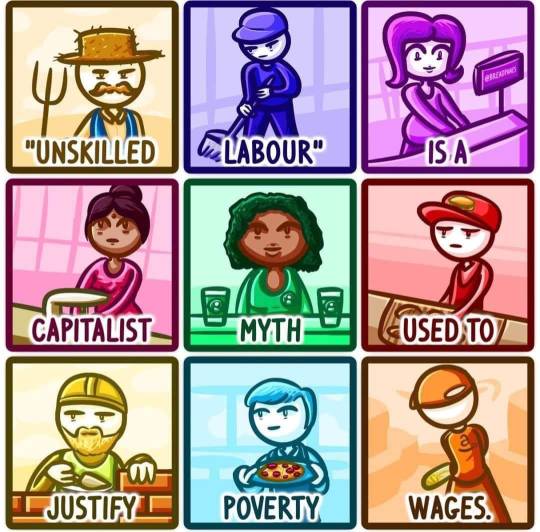
8 notes
·
View notes